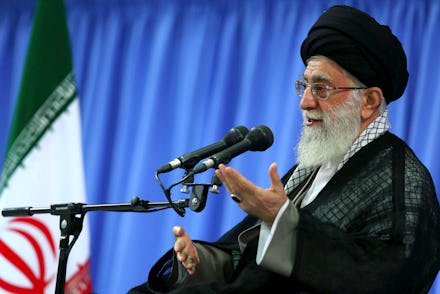Iran Nuclear Deal Would Be Full Of Winners and Losers

It is expected that the West and Iran will conclude an agreement by the end of this week in Geneva to freeze Iran's nuclear program, in exchange for lessening some — and, potentially all — of the economic sanctions imposed by the United States on Teheran. Predictably, Israeli Prime Minster Benjamin Netanyahu decried this most recent development, but it is possibly the best news to come out of the Middle East in several years.
A deal would significantly reduce tensions in the region, especially in light of the increasing instability in Iraq, Syria, Egypt and Libya — and Iran can be a major stabilizing factor in the region if the fear of a war over its nuclear program is set aside.
The deal will likely include limitations and accountability on Iran's nuclear program in exchange for reducing the sanctions on the country. The critical aspect concerning Iran's nuclear program is the level of enrichment and quantity of uranium that Iran possesses, along with the capacity to create it. On the other, sanctions must be lifting so that Iran's financial institutions can reintegrate with the global transactions regime. The deal will also routinize and legitimize Iran's nuclear program in an international context, but the biggest gains are going to be in the improvement of regional security.
There must be no illusion that regular diplomatic relations with Iran are a long-term prospect, because there are a number of diverging interests between Tehran and the West. Chief among those is Israel's increasing isolation, the evolving positiona of U.S.' Persian Gulf allies, especially Saudi Arabia, as well as the future of Iraq and Syria.
Normalization of relations with Iran will rearrange America's relations in the Middle East. Stepping back from striking Syria and settling with the Russian deal to destroy Syria's chemical weapons arsenal and infrastructure angered Saudi Arabia, which has an interest in having Assad replaced with a Sunni Islamic regime in Syria. While relations with Saudi Arabia may have chilled for the time being, the alliance will remain — however, Saudi Arabia will certainly shy away from the U.s. to a certain extent.
Benjamin Netanyahu was no less than panicked at the prospect of a deal with Iran. As the military factor is Israel's only available foreign policy instrument in the Middle East, the country's regional isolation will likely only deepen. Isolation is a severe liability for the Jewish state, because it would permanently put security out of reach, let alone having a constructive regional foreign policy. Netanyahu would do well to realize the risks that stem from that.
From the available evidence, Bashar al-Assad is en route to regain control of Syria, but his regime will be in a much weaker position after three of years of warfare that have essentially destroyed the country, killed untold thousands, displaced millions and left no winners. He will also no longer have WMDs and rebuilding conventional military capabilities will be long shot without a sound economy. Politically, Syria will be strongly influenced by Iran, even while the Iranian regime evolves, and having some predictability in relations with Tehran could very well help to stabilize any transition in Syria.
Iraq continues to be rattled by sectarian violence and it has only intensified two years after the withdrawal of American soldiers from the country. Geopolitically, Iraq is not an accident, as it was intentionally created on the intersection of Islam's fault lines. However, the country's chronic instability, in part fuelled by Iran and Saudi Arabia competing for regional domination, can serve to create a dangerously polarized axis between the two countries along political and religious lines.
For this reason, curtailing Saudi influence by lowering the Western security guarantee, while developing relations with Iran to check its nuclear program, could very well temper that regional tension. As for Iraq, it may continue to be the Middle East's black hole, until the Maliki government finds the capacity to control the centrifugal forces working against Iraq's political unity. Normalized relations with Tehran will also help to solve that puzzle.
What we see overall is that reducing tensions with Iran has many positive, but also some negative effects. It is a recognition that the solutions to many of the problems in the Middle East depend on what Iran does, but also a mature reaction by U.S. foreign policy at a time when fiscal pressures in Washington require a creative approach to engaging a multilateral world. Traditional partners will also have to evolve their positions to match changing realities.
In the end, it is diplomacy that offers the best tools for managing issues in the Middle East; war destroys lives, countries and only deepens the crises we try to solve.